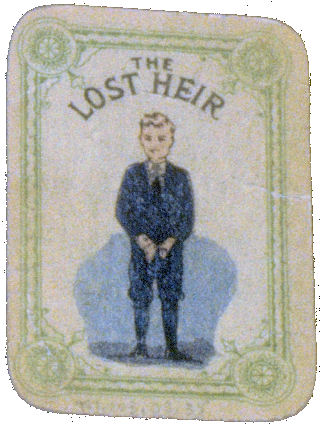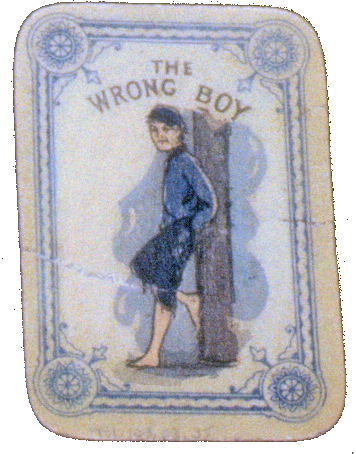
This older game is based upon a novel which was popular in the early years of the 20th century. There is a British version and an American version of this game, as well as the Canadian version which is partially pictured on the left. A Museum Website visitor reported that in 2002 the Canadian version of the game was still being manufactured by The Canada Games Company Limited, 61 Wildcat Road, Downsview Ontario, M3J 2P5.
The copy of the game pictured on the left was donated to the Museum in 1981. It was manufactured by The Canada Games Company Limited sometime in the 1920s. In adapting the game for Canadian use, both the English and the French languages are used. In each national version, the cards have the names of cities in the nation in which the game was intended to be sold.
The version pictured has the names of Canadian cities. The "blue" suit is Toronto, Ontario; the "green" suit is Winnipeg, Manitoba; the "black" suit is Halifax, Nova Scotia; the "orange" suit is Montreal, Quebec.
The box is 8cm long x 10.5cm wide x 2cm high and features a picture of the "lost heir". Each card is 9cm long x 6.5cm wide The backs of the cards (top of picture) have a geometric design.

The game represents a search by the police of four different cities for a "Lost Heir", for whose discovery a large reward has been offered. There are a number of characters who appeared in the novel, and each one is represented by a card in each suit (city), i.e. - the mayor, the police commissioner, the police chief, a police captain, a detective, a police sergeant, and a policeman. However, there are other cards in the deck - the Lost Heir (pictured on the right) dressed in a blue suit, and the Wrong Boy (pictured below) who is dressed in rags!
Play of the game is a combination of elements from a number of older European playing card games.
All cards (as in many card games) have a "playing value" or "rank" - that is their relative strength during play of the game - and secondly, a "point value" that is assigned to them. The point value counts toward determining who wins a game.
The game of Lost Heir consists of forty points - the one first making that number wins the game.
Lost Heir uses a modified "piquet pack" of playing cards. There are thirty-two cards in that deck and in the Lost Heir deck. Some cards in the deck are "ranked", in that they have a higher playing value during play of the game - much like a "King" has a higher playing value than a "Queen" in a standard deck of playing cards.

Lost Heir is a "trick-taking-game." A "trick" consists of one card played in turn in each round by each player in the game. A "trick" may be two cards (two players), three cards (three players), or four cards (four players in the game). A "trick" is won by the player playing the most powerful card in that round. At the start of the game (see below) one suit is designated as "a trump suit". Any card of a designated "trump suit" ranks higher than any of the other cards of a non-trump suit, regardless of the card value. The player who plays a "trump" card wins a "trick" because it ranks higher than any card of a non-trump suit.
One card in the deck pictures and represents the Lost Heir. Another card pictures and represents the Wrong Boy. These two cards have no rank, but have special point values which are discussed later in these instructions. Two additional cards are blank cards, without rank or point value. The twenty-eight remaining cards in the deck are divided into four suits of seven cards each; each suit being of a different color. These cards represent officials and police of four cities. For each city, the seven cards are named and are ranked with their individual point values as follows, i.e. - a "Mayor" (which has a point value of 7) is a higher rank than a "Chief" (which has a point value of 6), or of a "Detective", etc.
One of the players first shuffles the cards, and beginning with the first player to his left, deals them one at a time, until all are distributed. The dealer then asks, "How much am I offered for choice of Police to recover the Lost Heir?" The player to the left to dealer has the right to first bid, and makes an offer. If the next on the left can offer more, he raises the bid, and so on round to the dealer. If any player raises the bid, it passes round again until no one will bid higher.
The dealer may then accept the bid or not as he chooses. If he accepts it, he scores for himself as many points as offered. The player who has won the bid begins the play by laying on the table a card of any color he chooses, and that color is the trump for the round. If the dealer thinks he can make more out of his hand than the bid offered, he has the right to refuse all the bids and begins the game by leading the color that he wishes to be trump. If the dealer refuses the amount bid and fails to make that amount, he is prevented from making any points.
Every player must follow (beginning with the first player to the left) and play a card of the same color or suit as the one led, or a trump card as the player thinks best. If a player has neither a trump nor card of the same color as that laid out, he may "throw off" - that is, play a card of any other color. The card that ranks the highest will take the trick (the cards that have been played), but it will be remembered that any trump card, no matter how low in rank, will take any card of another color. Each trick counts one point to the player winning it.
The Lost Heir card counts five points as a reward for his recovery, and in counting up is to be added to the number of tricks taken. Thus, if a player has five tricks and the Lost Heir, it would count a total of ten points. The Wrong Boy counts three against the player who takes him in, thus, if a player has three tricks in one of which is the Wrong Boy, he counts nothing, as the three lost by the Wrong Boy destroys the count of the three tricks he won.
If a player bids a certain number for the privilege of making the trumps (or choice of Police) and fails to make all he offered, he counts nothing, thus: a player bids five for chance of Police and only wins four, his failing to make five prevents him from counting anything, but if he makes the five, then he adds that number of points to his score.
The game when played by four may be played by "each one for himself" or as partners; if played by "each for himself;" the "first one out" continues to play until another player has won the forty points as "second out" when the game ends and a new one begins. If played as partners, the bidding is the same as though played "each for himself"; but when the trump is led, those who sit opposite and are partners and act in concert, and the total number of points made by both are counted as one or so much for a side. When played as a three handed game, the two blank cards are thrown out, thus reducing the pack to thirty cards, dealing ten cards to each player.
Last update March 9, 2010